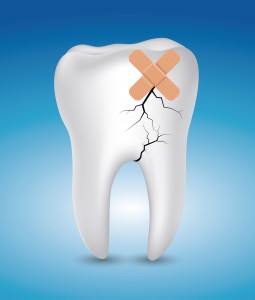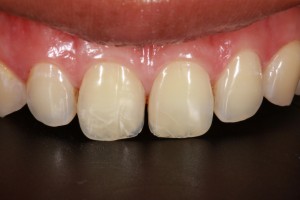What is cracked tooth syndrome?
The enamel that makes up our teeth is the hardest substance in our body. It’s even harder than bone. But the wear and tear we place on our teeth through biting, grinding, and trauma can still cause cracks in our teeth. Sometimes the cracks are so small that you can’t even see them, but they’ll still cause the pain and discomfort of cracked tooth syndrome (CTS).
These are the major symptoms for CTS:
 pain when biting, especially when the bite is released
pain when biting, especially when the bite is released- pain when eating or drinking cold or sugary foods or beverages
- Although any tooth can crack, cracks usually occur to the back molars. These teeth get a lot of use every day and can get a further workout if you grind or clench your teeth.
- Cracks can be small and only effect the outer tooth enamel. They might cause no pain or they can extend through the tooth and down into the root of the tooth and cause severe pain.
- A small crack, if not treated, can lead to a lengthening of the crack and the symptoms of CTS, including infection and pain.
How to diagnose cracked tooth syndrome
Cracked tooth syndrome is one of the most difficult disorders to diagnose. Often the crack in the tooth is not visible, even in an x-ray. Dentists have special tools, like microscopes, dyes, and ‘bite tests’ to find a crack in a tooth and get to the root of the cause.
How to treat cracked tooth syndrome
 Cracked tooth repair depends on the extent of the crack, the location of the crack and the health of the effected tooth. Cracks in teeth, unlike cracks in bones, do not heal. The goal of treatment is to prevent worsening of the crack and to save the tooth.
Cracked tooth repair depends on the extent of the crack, the location of the crack and the health of the effected tooth. Cracks in teeth, unlike cracks in bones, do not heal. The goal of treatment is to prevent worsening of the crack and to save the tooth.
Possible treatments include:
- Bonding
- Placing a crown
- Root canal therapy
- There are instances when extraction of the tooth may be necessary, so it’s best to try to prevent cracks in teeth.
How can cracked tooth syndrome be prevented?
 Because we are always biting and chewing, it’s not always possible to completely prevent cracks in teeth. But there are some things you can do to reduce strain on your teeth, like:
Because we are always biting and chewing, it’s not always possible to completely prevent cracks in teeth. But there are some things you can do to reduce strain on your teeth, like:
- not clenching or grinding your teeth
- not chewing on hard objects, like ice
- wearing a mouthguard at night if you grind your teeth while you sleep
- wearing a face guard or mouth guard while paying contact sports
Get a checkup
To sum up, getting regular dental care is the best way to keep your teeth healthy and clean and prevent CTS. So, contact us for an appointment today.
Call Us: 954-568-9100
Contact us if you have a question or to
schedule your complimentary consultation!


